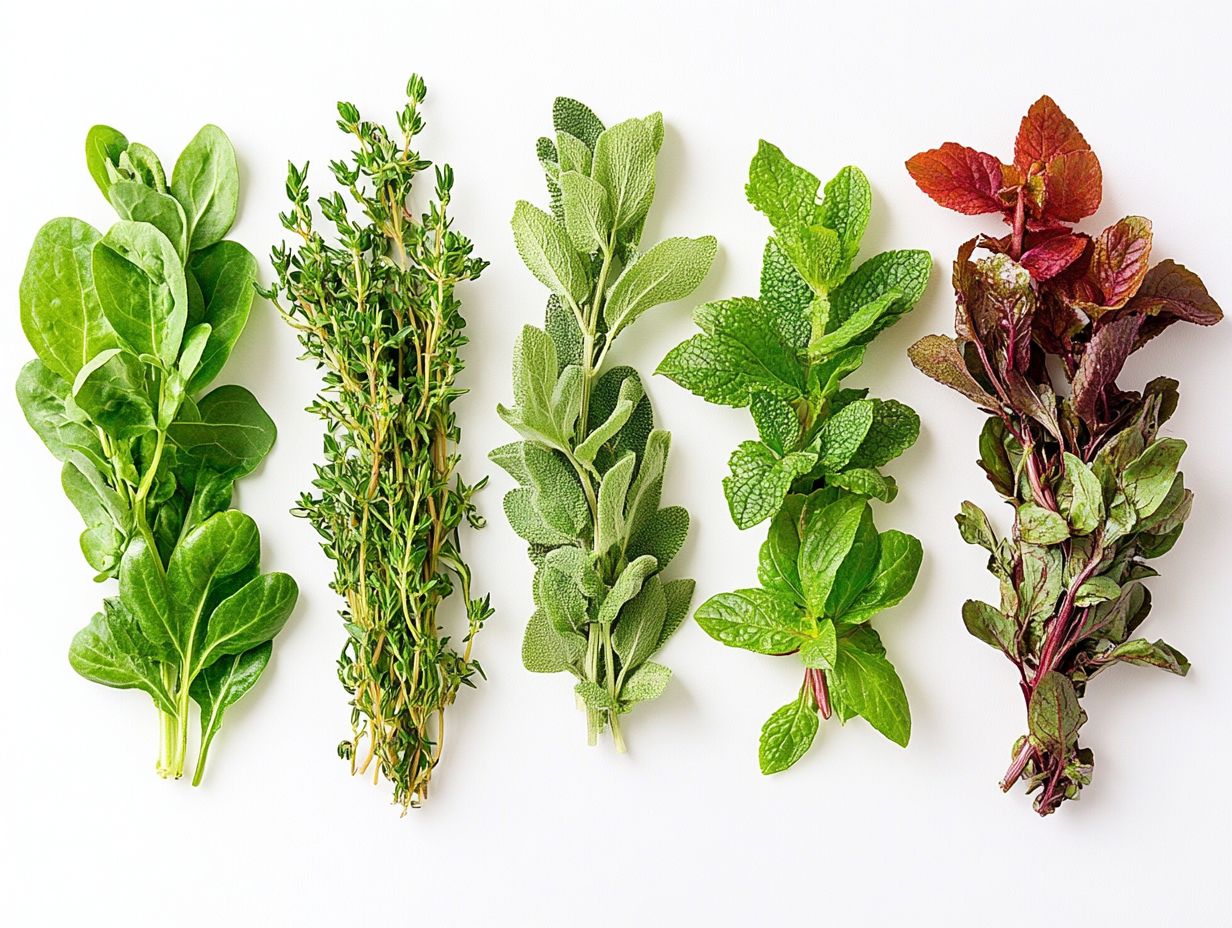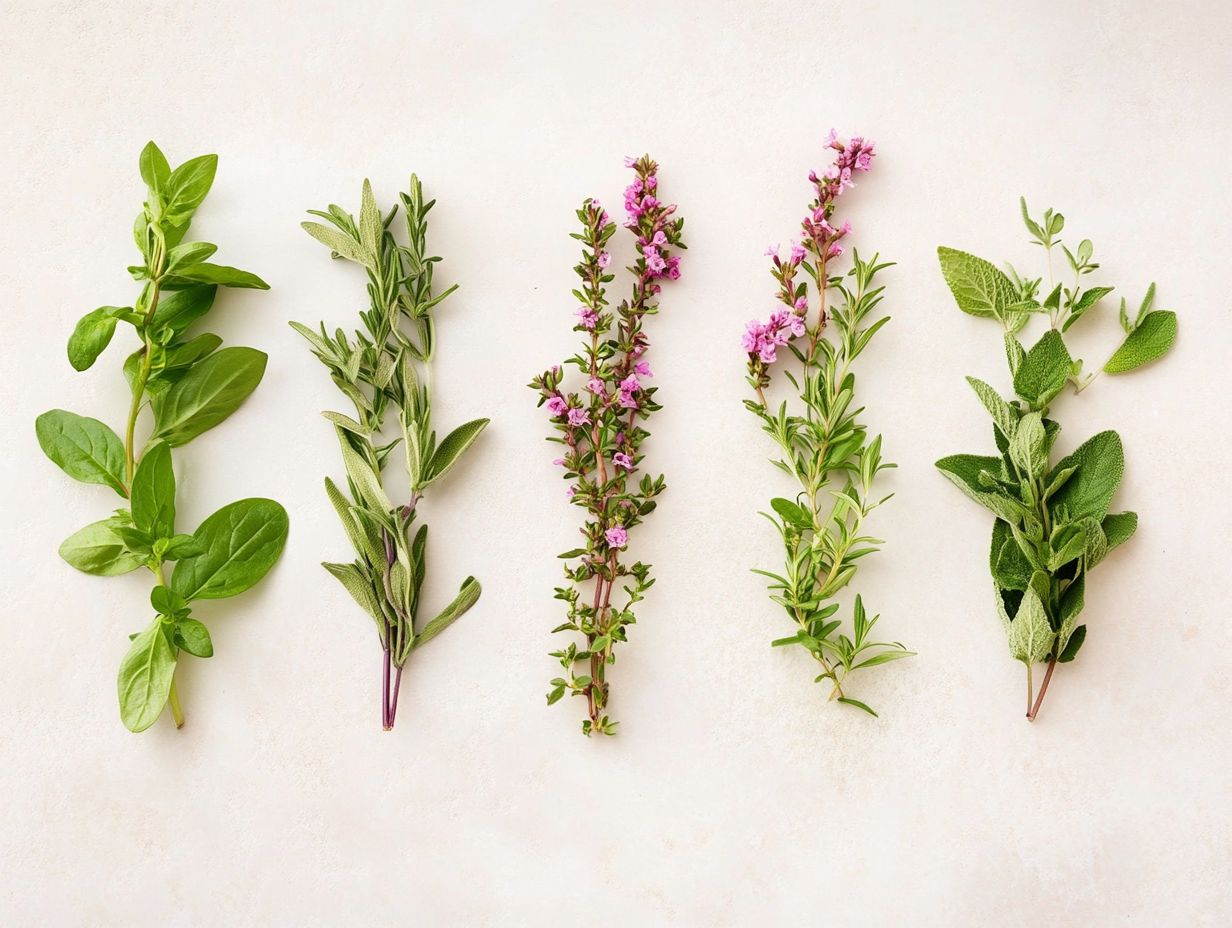Top 5 Herbs for Eye Health
In today’s fast-paced, screen-driven world, prioritizing your eye health has never been more crucial!
Fortunately, nature presents an incredible array of herbs that can support and enhance your vision.
Don’t miss out on these amazing benefits! This article highlights the top five herbs bilberry, ginkgo biloba, eyebright, turmeric, and saffron that have earned acclaim for their eye-boosting properties.
You ll explore the key nutrients they offer, their additional health benefits, and how to easily incorporate them into your diet, along with potential side effects and recommended dosages.
Discover how these potent herbs can lead you to clearer, healthier eyes!
Contents
Key Takeaways:

- Bilberry and ginkgo biloba contain antioxidants that can help improve eye health.
- Eyebright and turmeric have anti-inflammatory properties that benefit eye health.
- Saffron has been shown to improve vision and reduce the risk of age-related eye diseases.
1. Bilberry
Bilberry, a small but powerful berry, is loaded with antioxidants and is well-known for its exceptional benefits for eye health.
It plays a key role in preserving vision and preventing common issues like cataracts and age-related macular degeneration.
The unique mix of vitamins and nutrients in bilberry enhances visual processing, making it a top choice for those who prioritize overall health.
By incorporating bilberry into your routine, you can support healthy eyesight and potentially protect your eyes from damage from harmful molecules, encouraging long-term care and vitality.
What s truly impressive about bilberry is its high content of natural compounds that are good for your eyes, known as anthocyanins.
These compounds have been noted in many studies for their ability to enhance night vision and improve overall eye functionality.
Research shows that these antioxidants not only help reduce retinal inflammation but may also lower the risk of degenerative eye diseases.
When comparing bilberries to other natural remedies like their cousin, the blueberry, you’ll find that bilberries provide a more concentrated dose of eye-loving compounds, making them a better option for visual health.
To enjoy the eye-nourishing benefits of bilberry, consider adding them to your meals: toss them into smoothies, sprinkle them over yogurt, or try them in supplement form.
This delightful berry not only supports sharp vision but also adds a vibrant flair to your culinary creations.
2. Ginkgo Biloba
Ginkgo Biloba, a remarkable herbal remedy, is famous for enhancing circulation, making it particularly beneficial for your eye health and the preservation of vision.
This is especially true if you re facing common eye issues or conditions like glaucoma and diabetic retinopathy.
Ginkgo Biloba boosts blood flow, ensuring that essential nutrients and oxygen reach the delicate tissues of your eyes, promoting their overall well-being.
This herb is rich in antioxidants, which help fight oxidative stress a major factor in vision deterioration.
Research suggests that Ginkgo Biloba may also help reduce inflammation, providing extra protection against possible damage to your eyes.
Most people choose Ginkgo Biloba in supplement form, with a typical recommended dosage ranging from 120 to 240 mg per day.
Clinical studies have shown promising results, indicating that regular intake could lead to improvements in visual function and a decrease in symptoms associated with various eye disorders.
Start incorporating these herbs today for a brighter, healthier future!
3. Eyebright
Eyebright is a well-known herbal remedy for eye care. Its anti-inflammatory properties can relieve dry eye and conjunctivitis.
This herb has been cherished in traditional medicine, particularly in European folk practices. It was routinely used to soothe eye irritations and promote clarity of vision.
Eyebright is rich in active compounds such as flavonoids, which are plant compounds known for their health benefits, and tannins, contributing to its therapeutic effects.
You can find Eyebright in various forms teas, tinctures, or topical applications. Incorporating Eyebright into your preventative health routine may enhance your eye health. Scientific studies show it effectively alleviates symptoms linked to eye strain and allergies.
4. Turmeric

Turmeric, the vibrant golden spice enriched with curcumin, is gaining acclaim for its powerful anti-inflammatory and antioxidant benefits. These qualities can significantly promote eye health and prevent vision loss associated with age-related macular degeneration.
Recent studies indicate that curcumin effectively combats harmful effects to cells due to free radicals. By reducing inflammation, it may also help alleviate symptoms linked to various eye conditions.
Don t miss out add it to your smoothies, soups, or even a cozy cup of golden milk today! Each of these choices serves as a flavorful, health-enhancing solution.
For convenience, turmeric supplements are available, but it s wise to consult a healthcare provider to find the best fit for your lifestyle.
5. Saffron
Saffron, often hailed as the world s most expensive spice, is packed with potent antioxidants linked to enhanced vision and eye health. It is particularly effective in preventing age-related macular degeneration and improving visual acuity.
The key active compounds in saffron crocin and safranal are thought to safeguard retinal cells from oxidative stress and inflammation.
Incorporating saffron into your nutrient-rich diet is simple; sprinkle it into rice dishes, stir it into stews, or steep it as a delightful tea.
Recent clinical studies have shown that saffron supplementation effectively reduces visual impairment in individuals with macular degeneration. While adding saffron to your meals is beneficial, moderation is wise to avoid potential side effects.
How Do These Herbs Improve Eye Health?
Herbs like bilberry, Ginkgo Biloba, Eyebright, turmeric, and saffron are essential for enhancing your eye health. These plants are rich in antioxidants and anti-inflammatory properties that combat common eye problems and support vision preservation.
They offer a powerful blend of flavonoids, polyphenols, and carotenoids that work harmoniously to reduce oxidative stress and inflammation tied to various eye diseases. For instance, bilberry extracts improve night vision and protect the retina, potentially lowering the risk of conditions like glaucoma. Incorporating 5 herbs for enhancing longevity can also support overall eye health.
A study published in the ‘Journal of Ocular Pharmacology and Therapeutics’ indicates that Ginkgo Biloba can enhance peripheral blood flow. This may help stave off vision loss for those at risk of age-related macular degeneration.
Turmeric’s active compound, curcumin, delivers potent anti-inflammatory effects, making it particularly beneficial for tackling cataracts. Meanwhile, saffron has been linked to improved visual function in patients with early-stage age-related macular degeneration, underscoring the significant role these herbs with healing properties can play in maintaining and enhancing your eye health.
What Are the Key Nutrients in These Herbs That Benefit Eye Health?
Key nutrients in these herbs, like vitamin A, lutein, and zinc, play a vital role in your eye health. They help prevent vision loss and common eye issues.
Vitamin A is essential for good vision, especially in low light. It helps maintain your eyesight.
Lutein is a powerful antioxidant that blocks harmful blue light and protects the retina from damage.
Zinc aids in transporting vitamin A from the liver to the retina, ensuring everything functions optimally.
Incorporating dark leafy greens such as spinach and kale, along with vibrant fruits like carrots and bell peppers, can significantly increase your intake of these nutrients. These foods work together synergistically. For instance, lutein and zeaxanthin in greens enhance the effectiveness of vitamin A, contributing to better vision and overall eye health. Additionally, considering the top 5 herbs for hormonal health can further support your wellness journey.
What Are the Other Health Benefits of These Herbs?

Beyond their eye health benefits, herbs such as bilberry, Ginkgo Biloba, and turmeric offer many additional health advantages. They possess impressive anti-inflammatory properties and can enhance overall wellness.
Research highlights these herbs’ potential to strengthen the immune system, reducing your risk of infections. For example, Ginkgo Biloba can improve circulation, helping deliver essential nutrients and oxygen to your organs, which enhances your overall vitality.
Bilberry is celebrated for its antioxidant content, which fights free radicals and may lower your risk of chronic diseases like heart disease and diabetes. Turmeric, with its active compound curcumin, is known for its anti-inflammatory effects and has been linked to reduced joint pain and improved mood.
Scientific studies consistently support these claims, suggesting that adding these herbs to your daily routine may promote longevity and enhance your quality of life.
How Can These Herbs Be Incorporated into One’s Diet?
Incorporating herbs like bilberry, Ginkgo Biloba, Eyebright, turmeric, and saffron into your diet is easy and can be done in various ways. Consider culinary creations, soothing teas, and supplements that align with your dietary preferences while boosting eye health and overall wellness.
One delightful approach is to blend these herbs into smoothies, toss them into salads, or add them to meals. For example, you can use bilberry in jams or sauces, while turmeric adds a vibrant kick to your curries.
When choosing supplements, adhere to recommended dosages typically around 500 mg for Ginkgo Biloba and 400-600 mg for saffron. To ensure you re getting high-quality products, look for those that are certified organic and free from fillers. Pairing these herbs with healthy fats enhances absorption, allowing your body to effectively harness their maximum health benefits.
Start adding these herbs to your meals today and feel the difference!
Are There Any Potential Side Effects of Using These Herbs?
While herbs like bilberry, Ginkgo Biloba, and turmeric are generally safe for most people, it s important to be aware of potential side effects. Always consider your individual health history and consult a healthcare professional, especially when using them for eye health.
For example, bilberry can sometimes cause gastrointestinal upset, and its blood-thinning properties may interact with anticoagulant medications. Ginkgo Biloba, known for its cognitive benefits, can lead to dizziness or headaches and might affect blood pressure, posing risks if you re taking antihypertensive drugs. Turmeric, celebrated for its anti-inflammatory qualities, can also interact with medications like blood thinners and antacids, leading to complications.
To use these herbs safely, it s essential to follow recommended dosages and take any underlying health conditions into account. This ensures that your treatment plan is tailored to your individual needs.
What Are the Recommended Dosages for These Herbs?
The recommended dosages for herbs like bilberry, Ginkgo Biloba, Eyebright, turmeric, and saffron can vary significantly based on their form and intended use. Adhering to guidelines is crucial for effective eye care and overall well-being.
If you’re considering dried bilberry, the typical dosage suggests 20-40 grams per day, while standardized extracts might recommend around 80-160 mg. For Ginkgo Biloba, supplements often range from 120 to 240 mg daily, depending on the extract’s concentration. If you’re interested in Eyebright, you can opt for an infusion with 2-4 grams of dried herb steeped in hot water, or take it in capsule form at 300-500 mg. Additionally, exploring the 5 best herbs for digestive health can provide further options for enhancing your wellness.
Turmeric is usually consumed at 1-3 grams of dried root or around 400-600 mg of curcumin extract each day. For saffron, which is often used for its mood-enhancing qualities, a typical recommendation is about 30 mg per day.
It’s essential to consider factors like age, any pre-existing health conditions, and your desired outcomes. Therefore, consulting with healthcare providers is strongly encouraged before starting any herbal regimen.
Frequently Asked Questions

What Are the Top 5 Herbs for Eye Health?
The top 5 herbs for eye health are bilberry, ginkgo biloba, turmeric, saffron, and green tea.
How Does Bilberry Benefit Eye Health?
Bilberry contains anthocyanosides, which are powerful antioxidants that can improve overall eye health and reduce the risk of age-related eye diseases.
Can Ginkgo Biloba Prevent Age-Related Macular Degeneration?
Studies show that ginkgo biloba can improve blood flow to the eyes and protect against oxidative damage. This makes it a potential preventative measure for age-related macular degeneration.
In What Ways Can Turmeric Improve Eye Health?
Turmeric contains curcumin, a compound with anti-inflammatory and antioxidant properties that can help prevent or slow the progression of cataracts and other eye conditions.
What Makes Saffron Beneficial for Eye Health?
Saffron contains crocin and crocetin, two compounds found to protect against retinal damage and improve vision in individuals with age-related macular degeneration.
Is Green Tea Good for Maintaining Eye Health?
Yes, green tea contains catechins, which are antioxidants that can protect against eye diseases such as glaucoma and cataracts by reducing oxidative stress and inflammation.
For more information on herbs and eye health, consult a healthcare professional or explore further resources.






